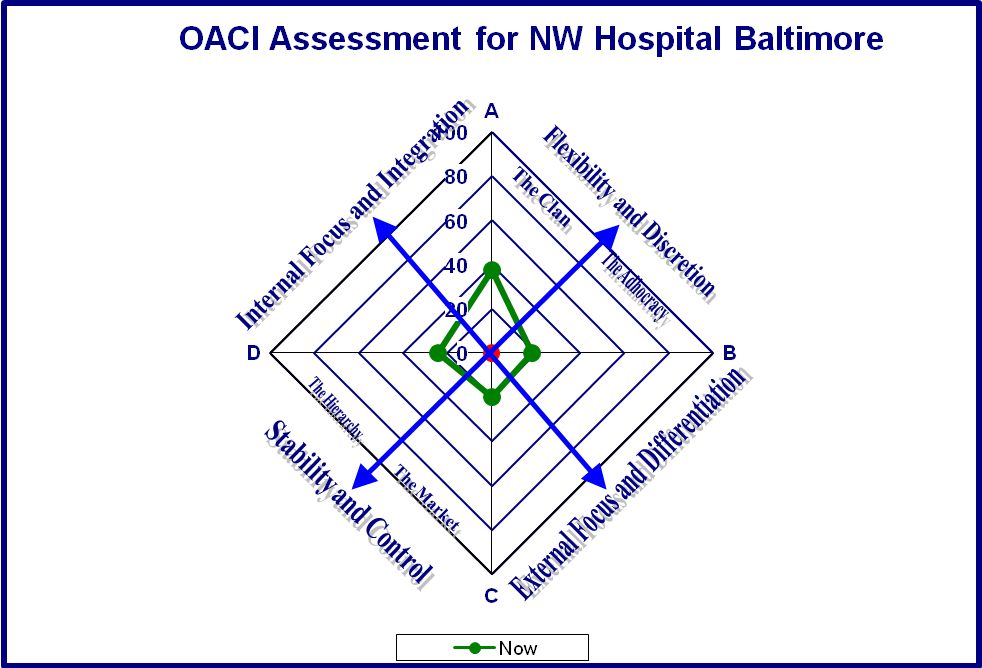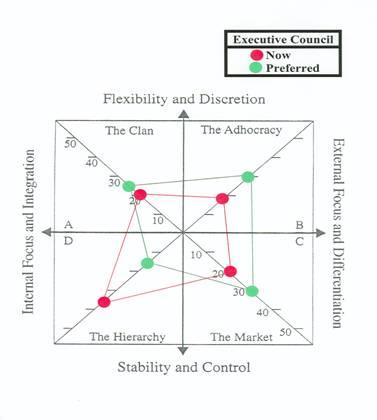Introduction
OCAI is one of the widely used tools when it comes to assessing the organizational culture of the organization. In essence, it is used to evaluate the leadership skills, strategic orientation, and managerial approaches applied. The tool is concerned with six different factors which include the dominant characteristics of the organization, the organizational leadership, strategic emphasis, organizational glue, and the management of employees as well as the criteria used to assess success in the organization (Pierce, 2010). Indeed, the six aspects are vital to the growth and the overall success of any organization. It is one of the reasons why it has been termed as one of the most effective tools for assessing the culture of an organization.
Assessment of NW Hospital Baltimore
Data concerning all the aspects included in the OCAI tool was entered by the prevailing perception of how the organization is managed and led. In essence, each of the six characteristics was assessed, and data entered in the respective cells. Each of the tool’s categories added up to 100 percent by the requirements of this tool. The resulting graph showed that the organizational culture

was more oriented towards the clan type of culture, as shown in this graph. Indeed, this disqualified all other types of organizational cultures that include adhocracy, market, and hierarchy. Essentially, having identified that the organizational culture is clan orientation, the emerging issues related to describing and identifying the characteristics of the clan type of organizational culture. In this regard, it was identified that the clan organizational culture is characterized by the various aspects as described in the next section.
Further and Detailed Analysis of the Organizational Culture
Orientation: Collaborative
As stated previously, the hospital’s organizational culture was found to exhibit a CLAN culture. The general orientation of a CLAN based organizational culture is essentially collaborative. In this regard, an organization treasure the spirit of creating a cohesive and well-coordinated team that helps to divide roles among the players and the stakeholders. Collaboration becomes the key to developing a coordination system that works systematically. It implies that one member of the organization complements the rest. In the same way, departments operate about each other to ensure that the entire system achieves a common objective. Essentially, those organizations that use collaborative approaches to coordinate operations are good at teamwork and group-based development.
Leadership Style: Mentorship
When it comes to the issue of leadership, the organization seems to use a mentorship and facilitation approach. In this case, the leaders and administrators play a motivational and inspirational role. Instead of forcing the company employees to act in terms of rules and regulations, the administrators seek to inspire the employees. It implies that the organization relies on increasing self-understanding and self-motivation to increase the employees’ commitment.
In essence, the use of facilitation and mentorship has been considered very successful especially when applying models such as transformational leadership. In addition to facilitation and mentorship, the organization depends on building teams and bonds among these employees. It is facilitated by a high level of leadership development. Understandably, team creation is highly dependent on cohesive leadership in the organization. However, the most interesting aspect is that team building also contributes to the development of leadership proficiency.
Value Drivers: Communication, Commitment, and Progressive Development
The hospital operation is driven by three critical factors which include communication, development as well as communication. Commitment is perhaps the most effective driver in this case. An organization that steers development and leadership seeks to increase the commitment of the employees and other members of the organization. As such, commitment becomes a critical factor in the operation and the effectiveness of the organizational systems.
It is facilitated by mentorship and the favorable environment created by the leadership orientation of mentorship. In addition to commitment, the hospital is also driven by cohesive and reliable communication channels. In this regard, the hospital has well-coordinated communication systems that facilitate the flow of information from the hospital and the patients. Customer care helps clients to deliver their complaints, compliments, and suggestions to the hospital directly. They are also able to inquire about the hospital’s operations and service delivery. Communication is also proficiently managed about how medical professionals communicate with their patients.
The professionals also have a well-stipulated communication channel when it comes to sharing information with other clinicians. As such, communication becomes essential in this case due to the issues of multidisciplinary approach when dealing with the diagnosis. Lastly, the hospital is highly driven by the pursuit to progress and develop at various levels. Importantly, the hospital seeks to improve services and increase the capacity of patients who are served. As such, the administrators pursue and developmental course of action in all aspects of the hospital’s operations.
Theory of Development
The hospital applied a Human Development Theory, which states that human progress in an organization is a crucial developer of effectiveness. This theory appreciates that an organization cannot grow if it does not make those people serving it successful. When the employees and administrators become successful, the organizations have higher chances of growing. On the contrary, the organizations that do not improve the livelihood of the employees and other members have a low likelihood of development. As such, the theory is highly developed on the premise that development happens through people.
Comparison with Other Students’ Analysis

In one of the analyses conducted by students, they sought to consider and determine the kind of organizational culture used in SDSMT Campus. In this regard, they came up with results, as shown in this graph. In this case, the analysis of NW Hospital was based on the current approach. As such, the comparison between the two will dwell on the red graph in the case of the campus and the green graph in the case of NW Hospital.
It cannot be disputed that the students identified the campus to have a hierarchical organizational culture. Now, unlike the NW Hospital’s organizational culture, their analysis shows that the campus focuses on controlling the system rather than fostering collaboration. Its leadership approach is coordination and organization, while the main value drivers include efficiency and timelines. These are completely different approaches when compared to the NW Hospital, which uses communication, commitment, and development as the main drivers.
Conclusion
OCAI has been used extensively to assess the organizational culture of companies as well as other entities. Regarding the question of which organizational orientation NW Hospital Baltimore takes, it is evident that the entity embraces a CLAN organizational basis of operation. The hospital uses collaboration as the main orientation when it comes to all its operational needs. Regarding leadership, the administrators embrace mentorship and facilitation as the main leadership methods. Besides, it cannot be disputed that the organizational drivers include communication, development, and commitment, among other pertinent things.
Reference
Pierce, J. (2010). Is the Organizational Culture of the U.S. Army Congruent with the Professional Development of its Senior Level Officer Corps. Carlisle, PA: Strategic Studies Institute.